Are you new to the world of PPC Terms and failing to comprehend the industry jargon?
Don’t worry, we’ve got your back!
We’ll go through a thorough vocabulary of PPC terminology in this post, including everything from PPC marketing terms to PPC search terms.
After this blog, you’ll have a firm grasp of the essential PPC terms and be able to confidently navigate the world of PPC advertising.
Therefore, let’s dig in and explore the world of PPC Terminologies!
PPC Glossary of Terms: Understanding the Vocabulary of PPC Marketing
- Active View cost-per-thousand-impressions (Active View CPM):
Advertisers use Active View cost-per-thousand-impressions (Active View CPM) bidding to bid on 1000 visible impressions and only pay for viewable impressions, which occur when at least 50% of the ad is displayed on-screen for at least one second.
- Ad Campaign
In PPC advertising, an ad campaign is a series of adverts prepared by an advertiser with a common purpose or objective.
An ad campaign’s purpose is usually to promote a product, service, or brand and drive visitors or conversions to a certain landing page or website.
- Ad Copy
Ad copy is a PPC marketing term which refers to the text or picture that appears in a search engine or website advertisement.
This PPC term consists of a headline, description, and display Link.
- Ad Delivery
Ad delivery in PPC (Pay-Per-Click) advertising refers to the process of delivering advertisements to the ad campaign’s target audience.
Moreover, this PPC search terms is governed by a variety of criteria, including ad targeting choices, bidding strategy, budget, and ad quality.
- Ad Extensions
PPC (Pay-Per-Click) advertising ad extensions relate to additional information that may be added to a conventional PPC ad to offer more context to the user and boost the ad’s exposure and performance.
Phone numbers, addresses, further links, and other information may be included in ad extensions.
- Ad Group
An ad group is a collection of connected adverts that target a certain set of keywords or phrases in PPC (Pay-Per-Click) advertising.
PPC general terms like these consist of a collection of keywords, a set of advertisements, and a landing page that is relevant to the advertising and keywords in that group.
- Ad Network
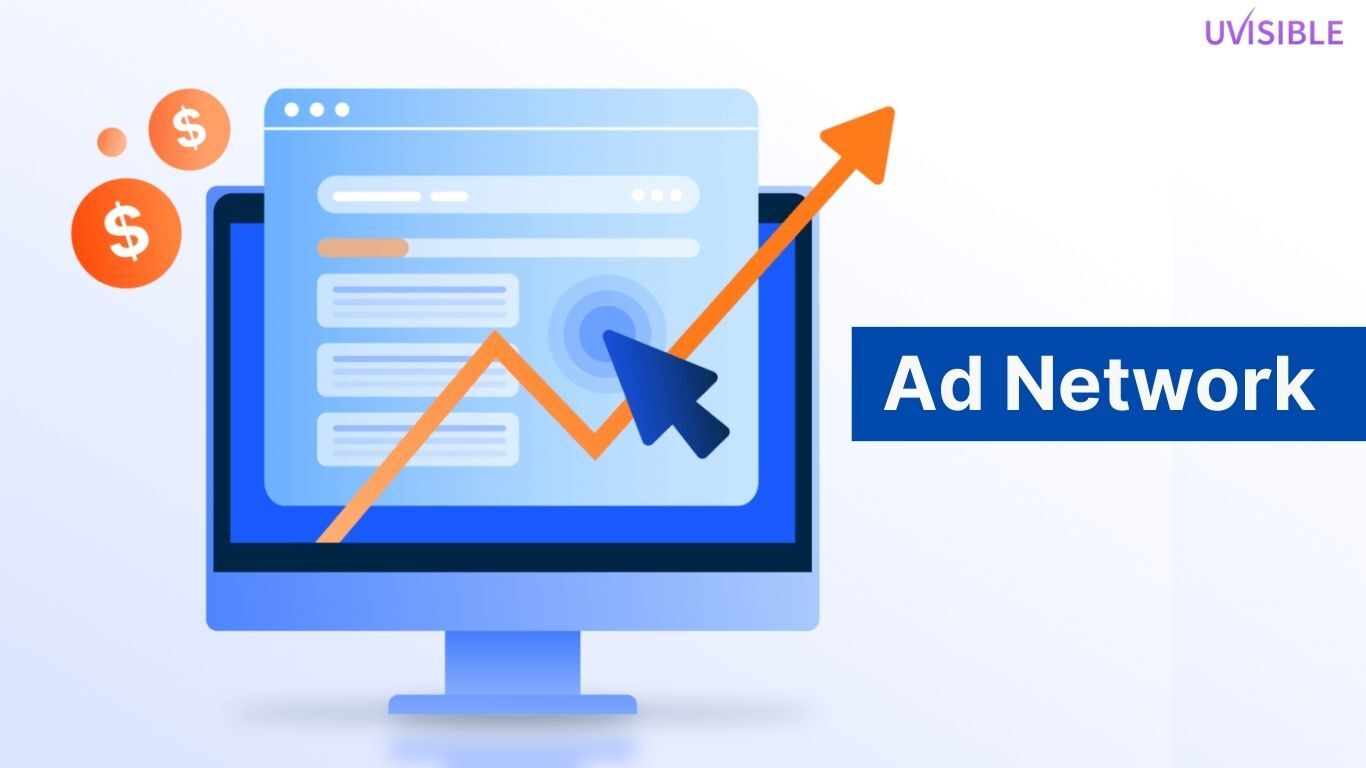
An ad network is one of the PPC important terms which refers to the platform that links marketers with publishers that have accessible advertising space on their websites.
Ad networks serve as go-betweens for advertisers and publishers, allowing marketers to display adverts on numerous websites within the network.
- Ad Position
The positioning of an advertiser’s ad on a search engine results page (SERP) or a website is referred to as ad position in PPC (Pay-Per-Click) advertising.
The ad platform’s algorithm determines ad position based on numerous parameters, including bid amount, ad relevancy, landing page experience, and ad type.
- Ad Rank
Ad Rank is the position of an advertiser’s ad on a search engine results page (SERP) or a website based on the relevancy and quality of the ad, landing page experience, and bid amount in PPC (Pay-Per-Click) advertising.
Depending on the ad platform, Ad Rank is computed differently, but it takes typically numerous criteria into consideration, including the bid amount, ad quality score, predicted click-through rate (CTR), ad relevancy, landing page experience, and ad type.
- Ad Rotation
Ad rotation is the technique through which an ad platform rotates an advertiser’s adverts among their ad groups in PPC (Pay-Per-Click) advertising.
The parameters of this PPC general terms, influence how frequently and which adverts are presented to users.
- AdRoll
AdRoll is a retargeting and prospecting-focused digital advertising platform. Retargeting is the practice of displaying advertising to people who have previously interacted with an advertiser’s website or products, whereas prospecting is the process of identifying and targeting new potential consumers based on their browsing activity and demographics.
Want to skyrocket your GYM’s sales and revenue with proven PPC strategies? Check out our GYM PPC SERVICES here!
- AdSense
AdSense is a Google program that allows website owners to monetise their online content by placing advertising on their sites.
It is a type of Pay-Per-Click (PPC) Marketing in which website owners receive money every time a user clicks on an ad shown on their website.
Website owners may use AdSense to show a range of adverts, such as text, picture, and video ads, that are related to the content on their website.
- Ad Scheduling

Adscheduling, also known as ad dayparting, is a PPC terms option that allows advertisers to plan their ads to appear at specified times of the day or week.
Advertisers may optimise their ad campaigns by presenting adverts just when their target audience is most likely to be active and engaged.
- Ad Status
Ad Status is the current condition of an ad inside a given campaign in PPC (Pay-Per-Click) marketing.
It may also be described as the Google Description indicating whether your ad is eligible to appear and any restrictions on how or where it runs.
- Advertising Policies
In PPC (Pay-Per-Click) marketing, advertising policies refer to the standards and restrictions issued by ad platforms such as Google Ads, Facebook Ads, and Bing Ads that advertisers must follow while designing and executing ad campaigns.
These regulations are in place to guarantee that the advertisements presented on these platforms are safe, reliable, and relevant to the users.
- AdWords Campaign Experiments
AdWords Campaign Experiments (ACE) is a tool in Google Ads PPC (pay-per-click) advertising that allows marketers to test changes to their campaigns on a small fraction of their traffic before deploying them on a larger scale.
- AdWords Editor
Google AdWords Editor is a free desktop programme that allows marketers to manage their Google Adwords campaigns offline.
Advertisers may utilise AdWords Editor to make adjustments to their campaigns, ad groups, advertisements, and keywords before uploading the changes to Google Ads.
- AdWords Labels
AdWords labels as PPC terms are customisable tags that marketers may use inside the Google Ads platform to organise and categorise their campaigns, ad groups, advertisements, and keywords.
Labels in Ads may be added to any item in an account and used for several purposes, including measuring performance, testing various methods, and arranging ads by topic.
- Amazon Advertising
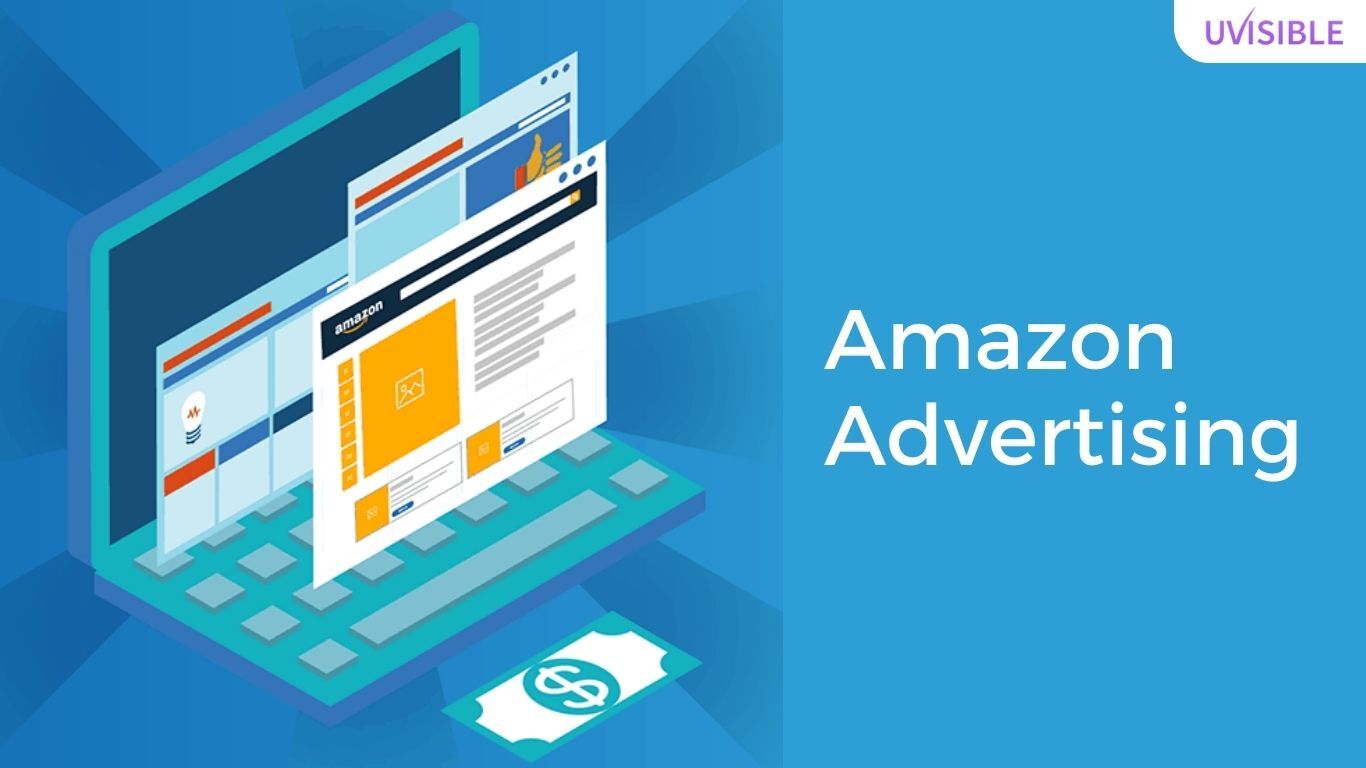
Amazon Advertising is a Pay-Per-Click (PPC) advertising network that lets marketers promote their items or brands on Amazon’s marketplace.
It further provides marketers with several ad styles and targeting options to help them reach their target demographic and increase sales on Amazon.
- Amazon Marketing Services (AMS)
Amazon Marketing Services (AMS) is an Amazon-created PPC advertising platform that allows marketers to promote their products and brands on Amazon’s marketplace.
AMS provides advertisers with some ad formats and targeting options to help them reach their target demographic and generate sales on Amazon.
- Analytics Content Experiments
Analytics Content Experiments is nothing less than an effective PPC tool offered by Google Analytics that allows marketers to test and optimize different versions of their website’s content to determine which version leads to the most conversions.
Earlier this PPC marketing term was known as the Website Optimizer.
- Application Program Interface (API)
In PPC Marketing, an API is a collection of protocols, tools, and routines that developers may use to interface third-party software applications with a PPC advertising platform.
- Assisted Conversion
In PPC marketing, assisted conversions are conversions that are impacted by several encounters with a website or ad, including interactions from various channels and devices.
- Audience
An audience is a specific group of people who are targeted by an advertiser with their adverts in PPC Marketing. Demographics, interests, habits, and previous encounters with a website or brand may all be used to identify an audience.
- Automated Extensions
In PPC marketing, automated extensions are ad extensions that are created automatically by the advertising platform based on information from the advertiser’s website or Google My Business account.
These extensions might include details like the advertiser’s phone number, location, and ratings.
- Automated Rules
In PPC marketing, automated rules are pre-defined conditions that advertisers may put up in their advertising platforms to automatically make adjustments to their campaigns based on particular criteria.
These rules enable advertisers to automate common processes and more efficiently improve their ads.
- Automatic Bidding
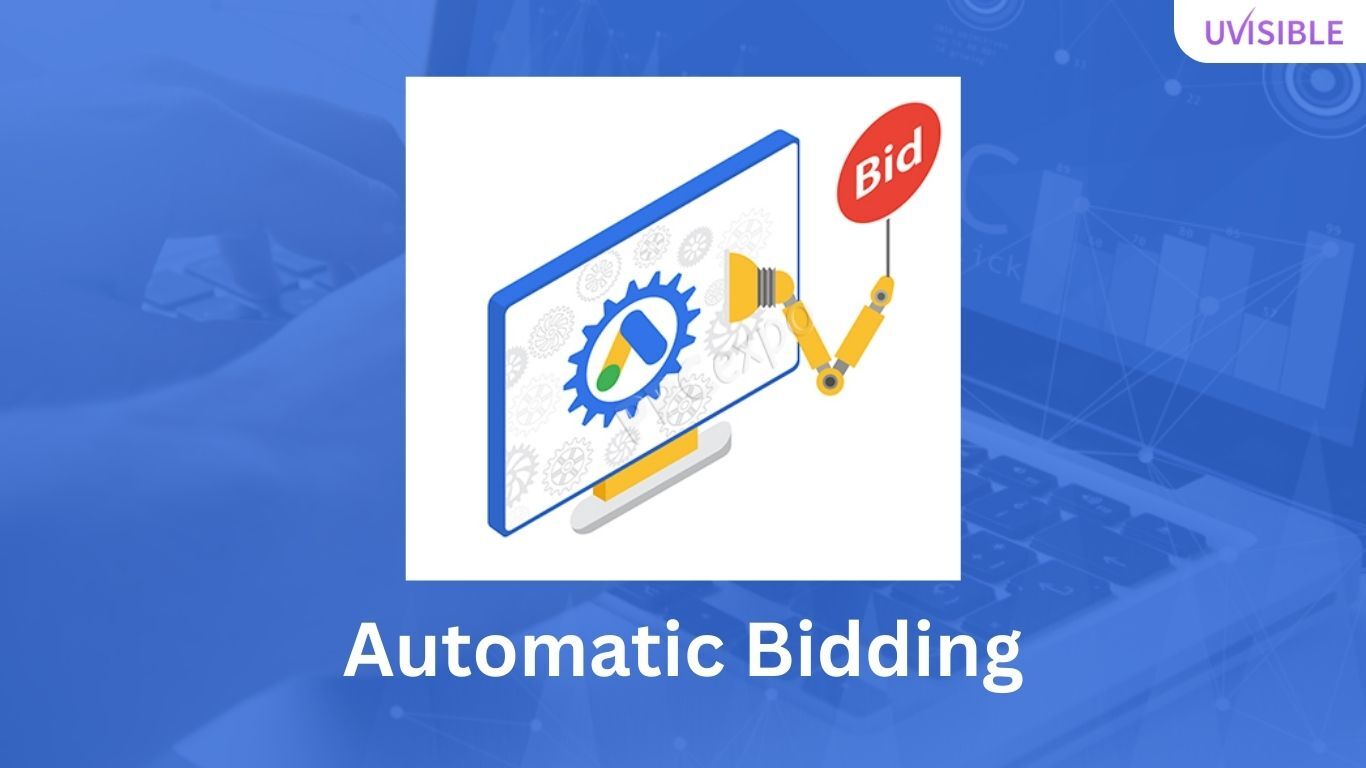
In PPC marketing, automated bidding is a bidding method in which advertisers enable the advertising platform to modify their bids for ad placement based on the intended outcome, such as clicks, conversions, or impressions.
- Automatic Placements
Automatic placements in PPC marketing refer to a feature in advertising platforms that allows advertisers to have their advertisements shown automatically on numerous websites or applications without designating specific ad placements.
- Auto-tagging
In the PPC glossary of terms, auto-tagging is a Google Ads tool that automatically appends a unique tracking code to the destination URLs of an advertiser’s advertisements. This tracking code, known as a “GCLID,” is used to track the ad’s performance.
- Average Cost-Per-Click (Avg. CPC)
The average cost-per-click (CPC) in PPC advertising refers to the amount an advertiser spends for each click on their ad.
The total cost of clicks is divided by the total number of clicks to determine the average CPC. If an advertiser spends $100 and receives 200 clicks on their ad, the average CPC is $0.50.
- Average Position
Average position is a PPC advertising indicator that displays where an ad appears on the search engine results page (SERP) in comparison to other adverts.
It is determined by the ad’s position in the auction as well as the position of other ads in the same auction.
Are you a Roofing Contractor looking to Broaden your Online Reach and Improve your Average Position? Avail of Uvisible’s ROOFING PPC SERVICES NOW!
- B2C PPC
PPC advertising initiatives that target individual customers rather than corporations or other organisations are referred to as B2C PPC (Business-to-Consumer Pay-Per-Click).
Retail merchandise, travel, entertainment, and personal services are examples of these PPC search terms.
- Bid
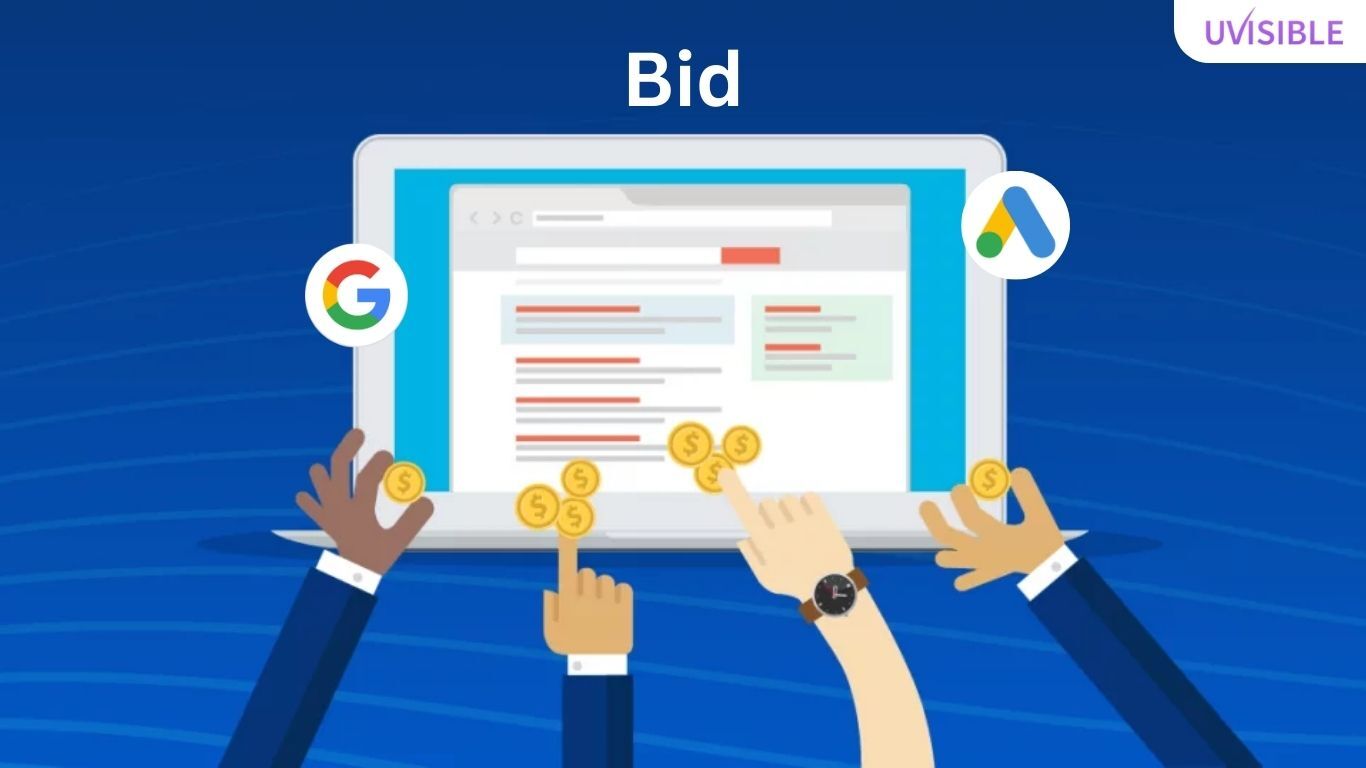
A bid is one of the crucial PPC terms, it refers to the highest amount of money an advertiser is prepared to spend for a click on their ad in PPC advertising.
The advertiser sets the bid (also known as Keyword Bid) during the campaign creation process, and it indicates the amount of money that the advertiser is ready to spend for a user to click on their ad and visit their website.
- Bidding Software
Bidding software for PPC (Pay-Per-Click) advertising is a tool that allows marketers to automate and optimise their bidding techniques to increase campaign success and profitability.
- Bidding Types
This PPC marketing term consists of various bidding methods available, each with its own set of benefits and drawbacks. There are three sorts of bidding available: focus on clicks (CPC), impressions (CPM), and conversions (CPA).
Manual Bidding, Automatic Bidding, Improved Cost-Per-Click, Target Cost-Per-Acquisition, Target Return on Ad Spend, and Cost-per-engagement are other Bidding Types.
- Bing Ads
Bing Ads is a Microsoft-created pay-per-click (PPC) advertising network that allows businesses to advertise on the Bing and Yahoo! search engines, as well as other partner sites.
Businesses may use this PPC marketing term to create and manage text, picture, and video advertisements that display on search engine results pages and partner websites.
- Bing Ads Editor
Among the various PPC terms, Bing Ads Editor refers to a free desktop programme developed by Microsoft that allows marketers to manage and modify their Bing Advertising campaigns when they are offline.
Advertisers may use Bing Ads Editor to create and update campaigns, ad groups, and advertisements, import and export data and make mass changes to numerous things at once.
- Bing Campaign Analytics
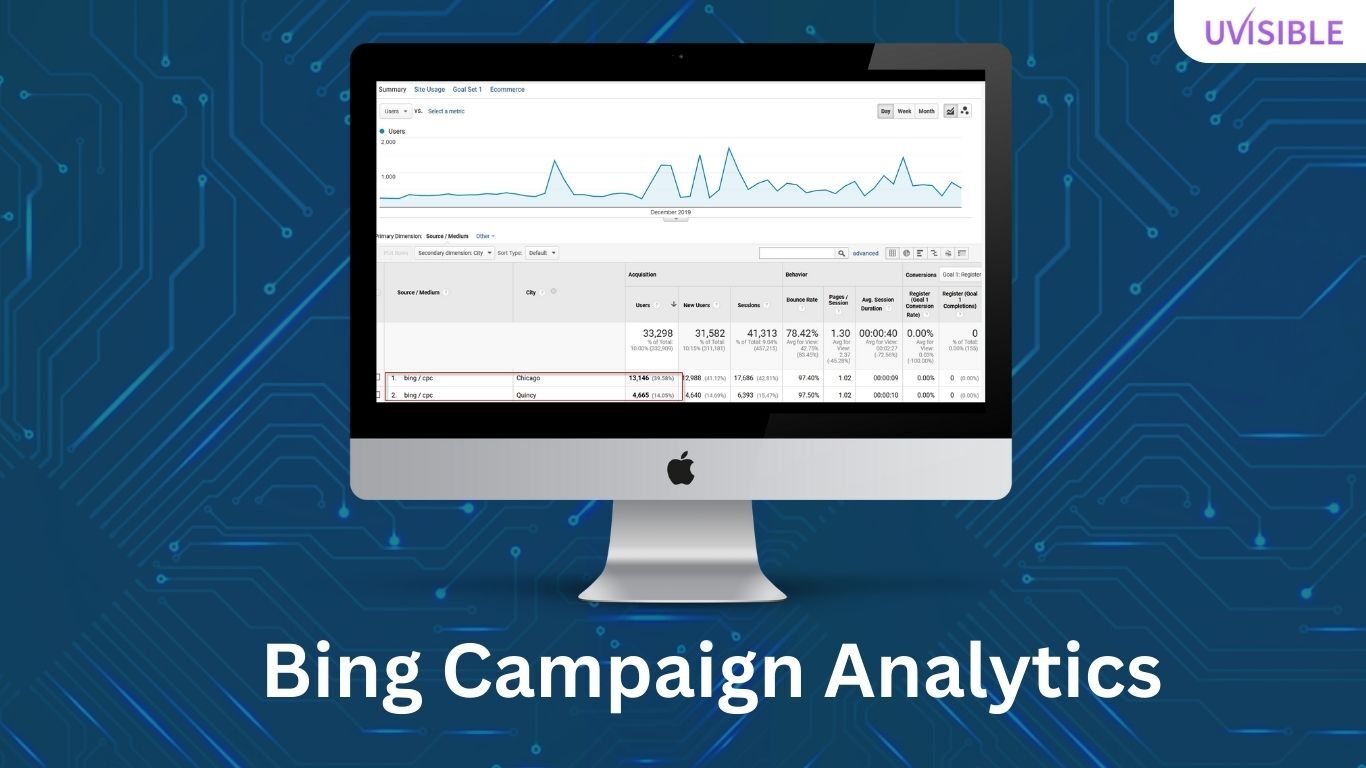
Bing Campaign Analytics is a Microsoft application that assists marketers in tracking and analysing their pay-per-click (PPC) advertising campaigns on the Bing search engine.
Advertisers may use such PPC search terms to analyse and track campaign analytics like clicks, impressions, conversions, and cost-per-click (CPC).
- Bid Management
In the PPC glossary of terms, bid management refers to the act of establishing and revising the maximum amount that an advertiser is ready to spend for a click on their ad.
A variety of criteria, such as the targeted keywords, the desired ad position, and the available budget, often decide the bid value.
- Bounce
In PPC advertising, a “bounce” occurs when a user clicks on an ad and then immediately leaves the landing page without taking any further action or engaging with the content on the page.
- Bounce Rate
The percentage of people that visit a landing page after clicking on an ad but depart without taking any further action or engaging with the content is referred to as the bounce rate in PPC advertising.
Want to Reduce the Bounce Rate of your Pest Control website? It’s time you Hire Uvisible! We offer result-driven PPC MANAGEMENT for PEST CONTROL COMPANIES!
- Broad Match
Broad match is a keyword-matching option in PPC advertising that shows advertisements to users who search for similar or related terms, as well as variants of those keywords.
An advertiser’s ad may be activated by wide match even if the user’s search query comprises synonyms, misspellings, or related terms.
- Broad Match Modifier (BMM)
Broad Match Modifier (BMM) is a PPC keyword matching option that gives marketers more control over which search queries activate their adverts.
An advertiser can use BMM to include a plus sign (+) in front of one or more words in a wide-match keyword to signal that those terms must be present in the user’s search query for the ad to be activated.
- Call Extensions
In the PPC glossary of terms, click extensions are a sort of ad extension that allows marketers to add more information and call-to-action buttons to their adverts.
Click extensions, which are often put beneath the primary ad language, might offer alternatives like “call,” “message,” “get directions,” or “visit website.”
- Callout Extensions
In PPC advertising, callout extensions are a sort of ad extension that allows marketers to incorporate additional descriptive text within their advertisements.
Callout extensions are distinct lines of text that show behind the primary ad content and provide more information about the advertiser’s products, services, or promotions.
- Call-To-Action (CTA)
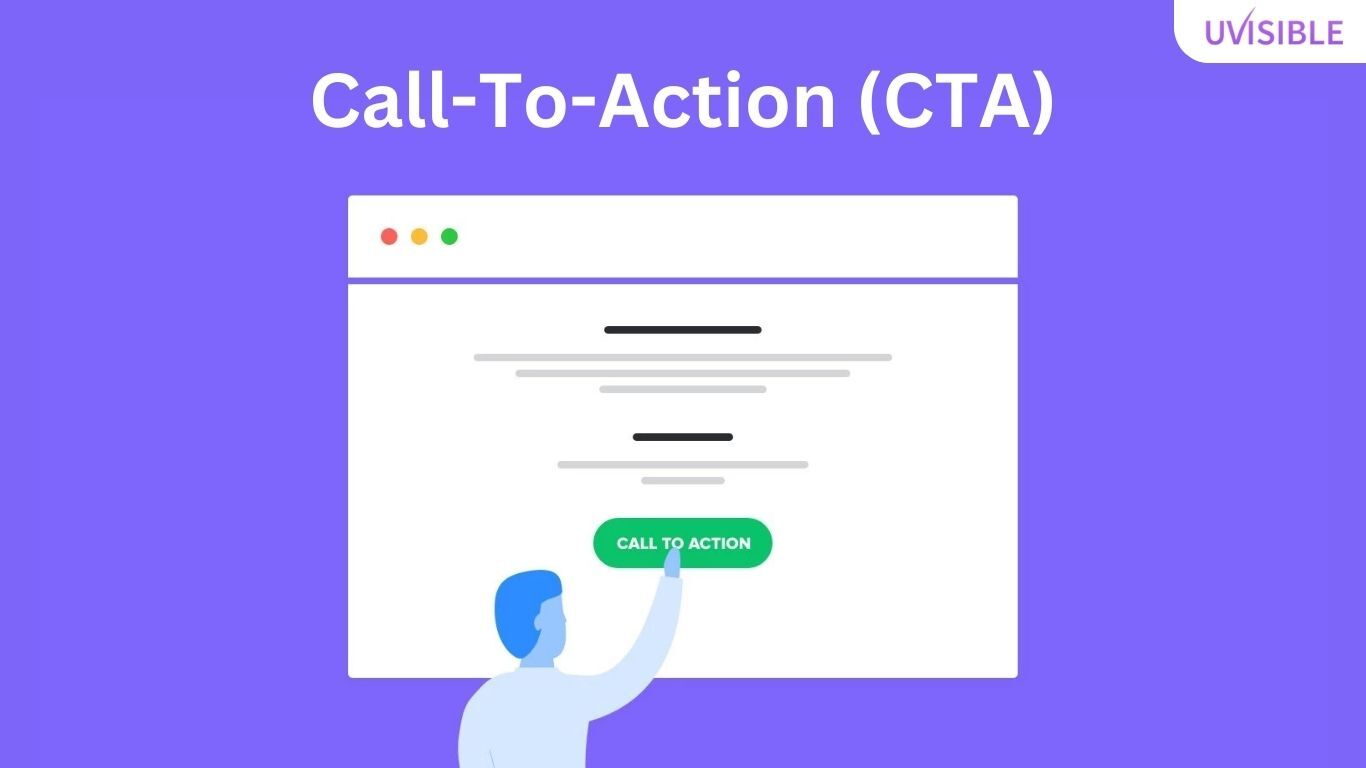
A call to action (CTA) is one of the pivotal PPC terms that refers to specific instructions or prompts that urge the user to do a certain action, such as clicking on an ad, filling out a form, making a purchase, or phoning a business.
- Campaign
A campaign is a specialised advertising effort or endeavour in PPC advertising that is aimed to achieve a certain goal, such as driving visitors to a website, generating leads, or increasing sales.
It is often comprised of a collection of advertisements or keywords that are targeted to a certain audience or geographic place.
- Change History
Change history is a tool in PPC advertising that allows advertisers to observe and track changes to their campaigns, ad groups, advertisements, and keywords over time.
It keeps track of all changes made to a PPC account, including the day and time the changes were made, who made them, and what changes were done.
- Click
In the PPC glossary of terms, a click refers to an instance when a user clicks on a specific ad and gets redirected to the advertiser’s website or landing page.
- Click Fraud
Click fraud is a fraudulent practice in which a person or software clicks on a pay-per-click (PPC) ad despite having no interest in the product or service advertised.
- Click-Through Rate (CTR)
The Click-Through Rate (CTR) is another important PPC terms, referred to as an indicator that quantifies the proportion of clicks an ad receives in comparison to the number of times the ad is presented (impressions).
CTR is computed by dividing the number of clicks received by the number of impressions generated by the ad and multiplying the result by 100 to obtain a percentage.
Looking to Improver your CTR for your Ecommerce site? Want help from experts who drink, breathe, eat, and sleep PPC Services? Contact Uvisible as your Ecommerce Marketing Services Agency Now!
- Client ID
A client ID is a unique identification provided to each client account in Google Adwords in PPC advertising.
This ID assists marketers and agencies in more efficiently managing various client accounts by keeping them structured and easily accessible.
- Contextual Targeting
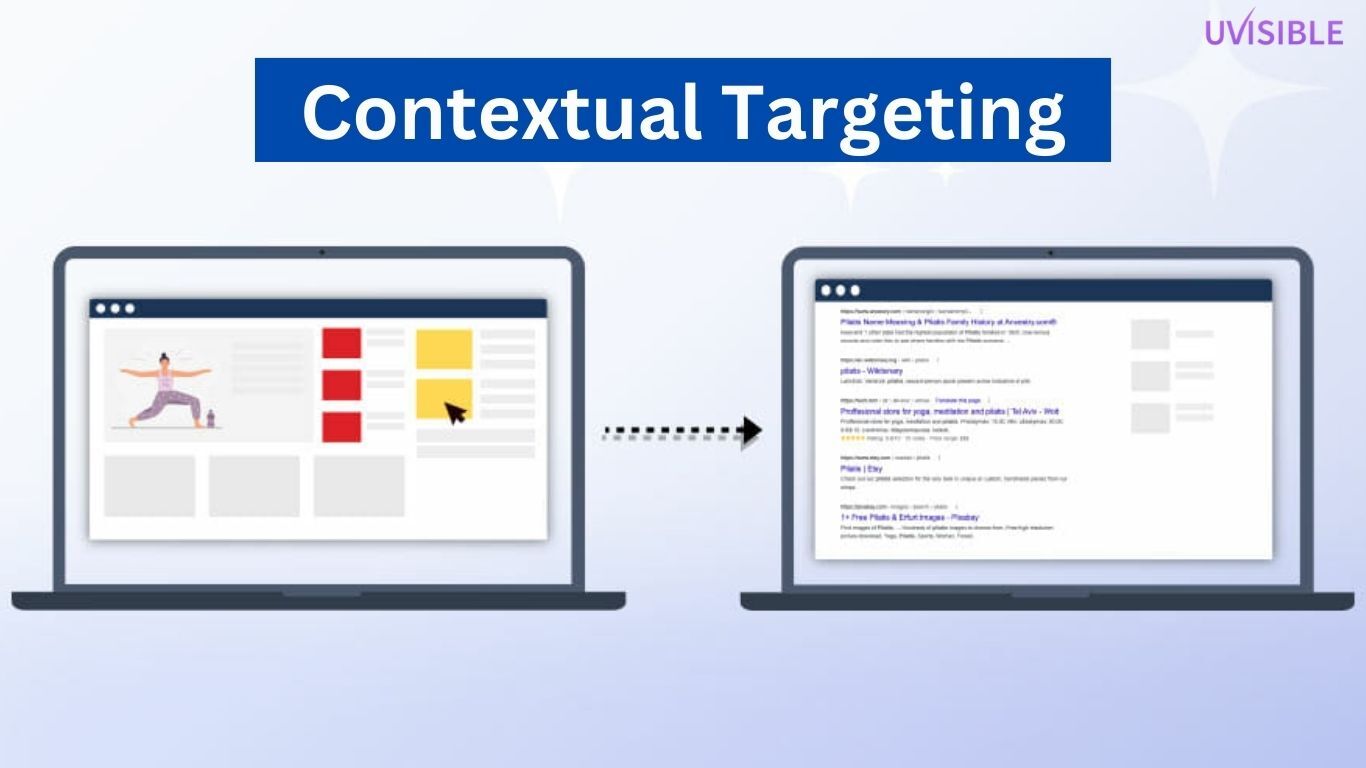
Contextual targeting is a form of PPC advertising targeting approach that serves adverts to visitors depending on the context or content of the website or web page they are presently viewing.
- Conversion
Conversion is one of the vital terms in the list of PPC important terms, it refers to when a user completes a desired action after clicking on an ad, such as completing a purchase, filling out a form, subscribing to a newsletter, or installing an app.
- Conversion Optimizer
A conversion optimizer is a technology available in PPC advertising systems such as Google Ads that employs machine learning algorithms to optimise ad campaigns for optimum conversions.
- Conversion Rate
Conversion rate is the percentage of individuals who click on an ad and perform a desired action, such as making a purchase or filling out a form, in PPC advertising.
It is computed by dividing the number of conversions by the number of clicks and multiplying the result by 100.
- Cookies
Cookies are little text files that are stored on a user’s device when they visit a website or click on an ad in PPC advertising.
These files save information on a user’s browsing history, including pages visited and activities taken, and allow advertisers to follow and target users with targeted adverts based on their interests and behaviour.
- Cost-Per-Acquisition (CPA)
Cost-Per-Acquisition (CPA) is another significant PPC marketing term which refers to the type of pricing model used in PPC advertising, where the advertiser pays a fee each time a desired action is completed, such as a sale or lead generation, as a result of a user clicking on the ad.
CPA is calculated as the total cost of the ad campaign divided by the number of acquisitions.
- Cost-Per-Click (CPC)
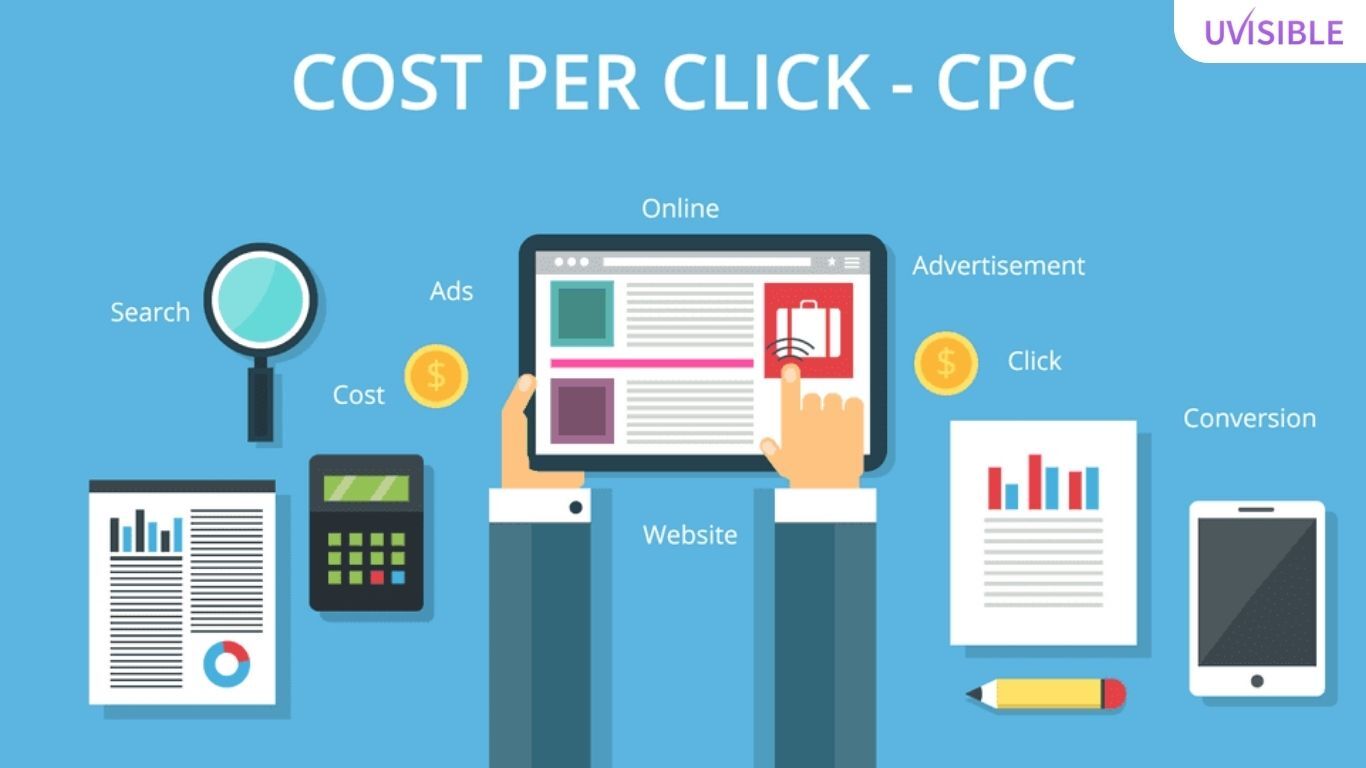
The cost per click (CPC) is a pay-per-click (PPC) advertising measure that refers to the amount of money an advertiser spends each time someone clicks on their ad.
The advertiser in a successful PPC campaign sets a maximum CPC bid, which is the most they are willing to spend for a click.
- Cost-Per-Conversion
Cost-Per-Conversion (CPC) is a statistic in PPC advertising that represents an advertiser’s total cost per conversion, which can be a purchase, sign-up, download, or other desired action after clicking on the ad.
PPC expenditure is divided by conversions to determine CPC. A $1,000 campaign with 100 conversions would have a $10 CPC.
- Cost-Per-Engagement
Cost-per-engagement (CPE) is a pricing model for PPC advertising in which an advertiser pays each time a user interacts with their ad.
Engagement can mean a lot of different things, like clicking on a link, watching a video, or liking a social media post.
- Cost-Per-Impression (CPI)
Cost-Per-Impression (CPI) is a PPC marketing term which refers to the pricing model for PPC advertising in which advertisers pay each time their ad is shown to a user on a website or platform, whether or not the user clicks on the ad.
In other words, CPI shows how much it costs for an ad to be seen or seen 1,000 times.
- Cost-Per-Lead (CPL)
CPL is a pricing mechanism in PPC advertising in which the advertiser pays for each lead produced by their adverts.
Divide the total cost of the advertising campaign by the number of leads generated to get the cost per lead.
- Cost-Per-Thousand Impressions (CPM)

CPM (Cost-Per-Thousand Impressions) is a number used in PPC advertising to calculate the cost of showing an ad 1,000 times.
The expense spent by the advertiser for every thousand times their ad is exposed to potential clients is called CPM.
CPM is determined by dividing an ad campaign’s total cost by the number of impressions and multiplying by 1,000.
- Cost-Per-View (CPV)
Cost-Per-View (CPV) is a PPC glossary of terms is a statistic that calculates how much an advertiser spends for each view or engagement with an ad.
The CPV model lets advertisers pay only on views or engagements, rather than clicks or impressions that may or may not result in a view or engagement with the ad.
- Customer Lifetime Value (CLV)
Customer Lifetime Value (CLV) is one of the PPC general terms, that shows statistic that calculates the total income generated by a customer for a business throughout their lifetime.
It is a critical indicator in PPC advertising since it allows firms to identify the real worth of their consumers and improve their marketing efforts appropriately.
Businesses must consider criteria such as average purchase value, frequency of transactions, and duration of client connection when calculating CLV.
- Daily Budget
The maximum amount of money a business or advertiser is prepared to spend on their pay-per-click (PPC) advertising campaign each day is referred to as the daily budget in PPC advertising.
This PPC marketing term can be set at the campaign level, which applies to all ad groups within the campaign, or at the ad group level, which provides more specific spending management.
- Data Filters
Data filters are used in PPC advertising to segregate and evaluate campaign data.
These filters enable marketers to acquire insights and enhance their campaigns by looking at particular data subsets, such as performance by time of day or device type.
- Day Parting
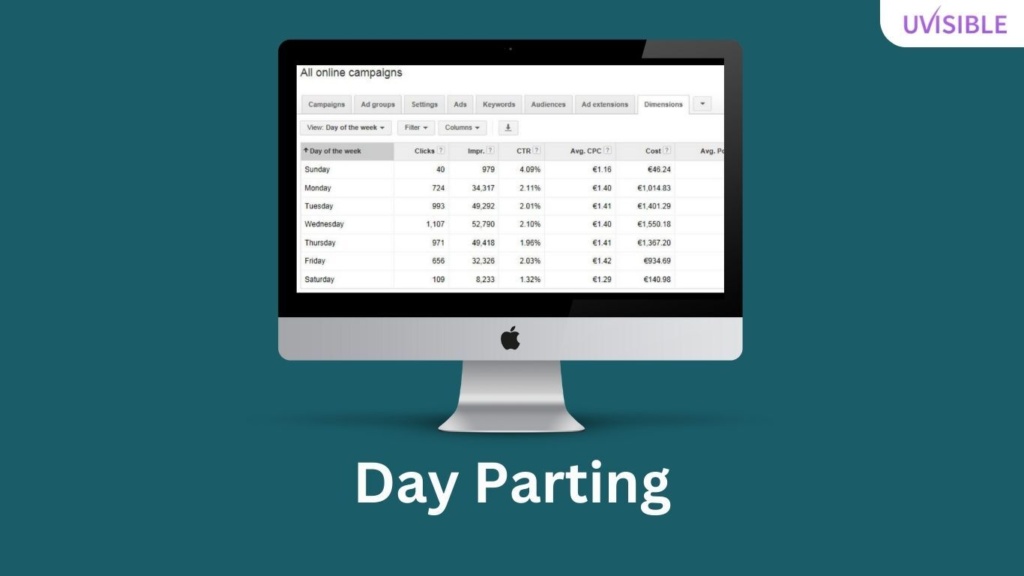
In the PPC glossary of terms, day parting refers to the practice of arranging advertisements to appear at specified times of the day or on specific days of the week.
Advertisers may use Day Parting to show their adverts at certain times when their target audience is more likely to be active or interested in their product or service.
- Default Max. CPC
When creating a new keyword, Default Max. CPC, refers to the maximum amount an advertiser is willing to spend for each click on their ad.
PPC terms like these consist of a bidding method that enables advertisers to establish a maximum cost-per-click (CPC) bid at the account, campaign, ad group, or keyword level.
- Destination URL
The destination URL in PPC advertising is the webpage to which a user is sent when they click on an ad.
It is the last landing page to which the visitor will be led to perform an activity like as making a purchase, completing a form, or subscribing to a service.
- Devices
The PPC search terms “devices” in PPC advertising often refers to the many types of devices on which adverts can be displayed, such as desktop/laptop computers, mobile devices (e.g., smartphones and tablets), and other internet-connected devices (e.g. smart TVs).
- Dimensions Tab
In the PPC glossary of terms, the Dimensions tab allows marketers to examine and evaluate performance statistics based on multiple dimensions or criteria.
- Display Campaign Optimizer (DCO)
Display Campaign Optimizer (DCO) is a Google Ads technology that optimises display campaigns using machine learning by automatically modifying targeting, bidding, and ad placement to match the advertiser’s intended goals, such as clicks, conversions, or impressions.
- Display/ Content Bid
The display/content bid is one of the PPC general terms that refer to the amount that an advertiser is prepared to pay each time their ad is clicked in a display or content network.
- Display/ Content Network
The display or content network in PPC advertising refers to a collection of websites, apps, and other online platforms that have collaborated with an advertising network to display adverts to their audiences.
Advertisers can opt to run their PPC advertisements on the display or content networks.
- Display URL
A Display URL is the web address that appears in an ad but is not the actual landing page URL in PPC advertising.
It is frequently used in advertisements to display the advertiser’s brand or domain name.
- Dynamic Ad Targeting
Dynamic Ad Targeting is a PPC strategy used to offer highly relevant adverts to users based on their recent search history, activity, demographics, and interests.
- Dynamic Keyword Insertion (DKI)

Dynamic Keyword Insertion (DKI) is a Pay-Per-Click (PPC) advertising tool that allows advertisers to dynamically integrate a user’s search query or another relevant term into their ad content.
DKI dynamically adjusts the ad content to match the particular phrase that caused the ad to appear, making the ad more relevant and tailored to the user.
- Editorial Review
In the PPC glossary of terms, editorial review refers to the process of analysing and approving or disapproving ad content.
It is a method used by search engines like Google and Bing to guarantee that advertisements are of high quality, relevant, and adhere to the search engine’s regulations and standards.
- Effective Cost-Per-Click (eCPC)
This is one of the most important PPC terms, Effective Cost-Per-Click (eCPC) is a PPC advertising measure that analyses the average cost of each click after conversions are taken into account.
It is computed by dividing a campaign’s total cost by the total number of conversions generated by that campaign.
- Embedded Negatives
Except for the PPC search terms themselves, this strategy allows marketers to display any permutation of a phrase.
This is a wonderful technique to reduce cross-contamination across campaigns/ad groups including similar or roughly related phrases and ad groups containing various match kinds.
- Enhanced Cost-Per-Click (ECPC)
Enhanced Cost-Per-Click (ECPC) is a PPC advertising bidding method offered in Google Ads.
Google automatically adjusts your manual bids in real-time for clicks that are more likely to result in a conversion on your website when you use ECPC.
This is accomplished by changing your bid based on signals such as device kind, location, and time of day, among other things.
- Exact Match
Exact Match is a keyword match type in PPC advertising that allows advertisers to show their advertisements solely to people who search for the precise keywords or phrases defined by the advertiser.
This sort of PPC general terms is a match type that provides the greatest keyword targeting and can assist guarantee that your adverts are displayed to the most appropriate audience.
- Expanded Text Ad
Extended Text Ads (ETAs) are a sort of PPC advertising ad format. When compared to typical text advertising, they give marketers greater area to exhibit their products or services.
Advertisers can use up to three headlines of 30 characters each and two descriptions of up to 90 characters each with ETAs.
- Facebook Ads
Facebook Ads is a type of pay-per-click (PPC) advertising service provided by Facebook, a renowned social media network.
Facebook Advertising enables companies and people to develop and show targeted ads to specific audiences on Facebook and its partner networks, such as Instagram, Messenger, and Audience Network.
- Facebook Dynamic Ads

Facebook Dynamic Ads is a sort of advertising format available through the Facebook Advertising network that allows marketers to show targeted adverts to individuals based on their browsing history and interests.
- Free Clicks
This is one of the PPC terms, which is also known as non-billable clicks, such as actions done on interactive advertisements. An expanding graphic, for example, as part of the ad format, will result in “free clicks” when that interaction happens.
- Frequency Capping
Frequency capping is a PPC advertising option that restricts the number of times an ad is shown to a single user over a particular period.
It enables advertisers to limit the frequency with which their advertisements are presented to viewers, ensuring that they are not exposed to the same ad over and again, which can lead to ad fatigue and lower performance.
- Geofencing
Geofencing in PPC advertising is a location-based targeting approach that allows marketers to target their adverts to consumers inside a defined geographic region.
This is accomplished by encircling a specific region with a virtual barrier, or “fence.”
- Geotargeting
Geotargeting is the technique of targeting certain geographic places where you want your adverts to appear in PPC advertising. It is also known as ‘Location Targeting’.
- Google Ads
Google Ads is Google’s pay-per-click (PPC) advertising network.
It enables companies and advertisers to develop and show advertisements on Google’s search engine results pages (SERPs) as well as other Google properties such as YouTube, Gmail, and Google Maps.
- Google Analytics
Google Analytics is a web analytics tool supplied by Google that allows marketers and website owners to measure and analyse traffic and user behaviour on their websites.
Google Analytics is frequently used in PPC advertising to assess the efficacy of campaigns and improve them for better performance.
- Google Ads Application Programming Interface (API)
The Google AdWords Application Programming Interface (API) is a platform that allows developers to create bespoke applications that interface with Google Advertising accounts directly.
The API enables programmatic access to practically all aspects of Google AdWords, including the creation and management of campaigns, ad groups, advertisements, and keywords; the retrieval of data and reports; and the management of budgets and billing.
- Google Ad Grants
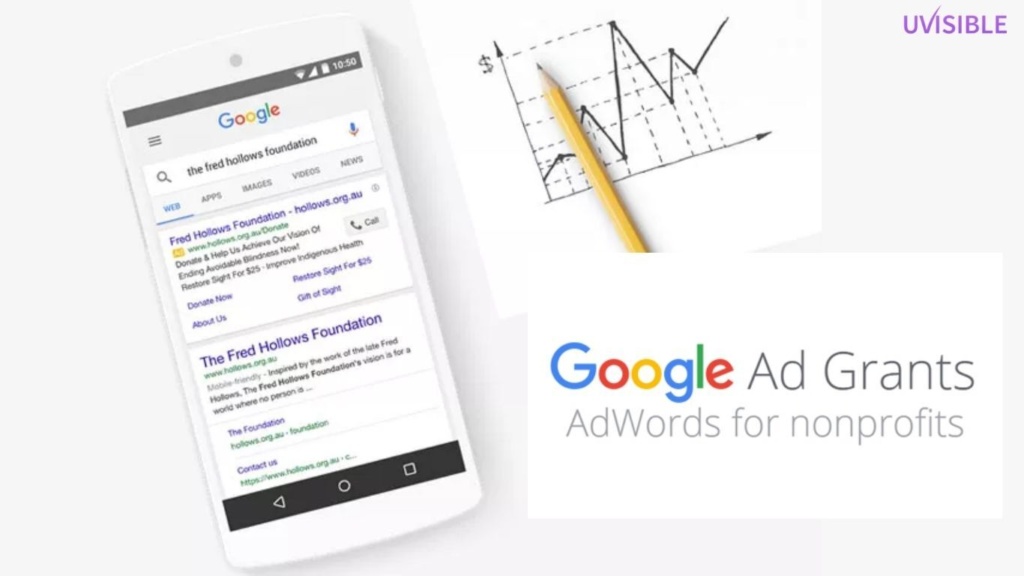
Google Ad Grants is a Google initiative that gives free advertising credits to qualified charitable organisations.
These organisations can use these credits to run advertisements on Google Ads to promote their purpose, boost awareness, and attract additional contributors or volunteers.
- Google Checkout
Google Checkout was a payment processing service that allowed internet merchants to take payments for their goods and services.
It was phased out in 2013 and was replaced by Google Wallet, which was then phased out and replaced by Android Pay and Google Pay.
- Google Forwarding Number
Google Forwarding Number is a Google Ads call extension tool that allows marketers to track and record phone calls made by their advertising.
- Google Merchant Center
Google Merchant Center is a PPC advertising platform that enables marketers to submit and manage product data streams.
Advertisers may utilise the Merchant Center to add product information such as photos, descriptions, price, and availability to generate Product Listing Ads (PLAs) in Google Ads.
- Google Optimize
Google Optimize is nothing but a PPC marketing term, that refers to a website optimisation and testing tool created by Google that enables marketers to test various variants of their website content and user experience.
Advertisers may use Google Optimize to develop and perform A/B testing, multivariate tests, and personalisation campaigns to optimise their website for more engagement, conversions, and income.
- Headline
A headline is the main title of an advertisement that displays at the top of the ad in PPC advertising.
The title is usually the first thing a person sees, and its objective is to capture their attention and convince them to click on the ad.
- Head Terms
‘Head Keywords’ in PPC Advertising refer to wide and highly competitive keywords with a large search volume. They are also known as the ‘Short-tail Keywords’.
Because of their prominence, these keywords often consist of one or two words and are widely sought after by advertisers.
- Hits
In the context of PPC terms, “hits” is not commonly used. It is more common to use terms such as clicks, impressions, conversions, etc.
However, it refers to the number of times a webpage has been seen. This PPC term comprises both new and returning visitors and can help you assess how effective your PPC ad’s click-through rate is.
- Image Ads
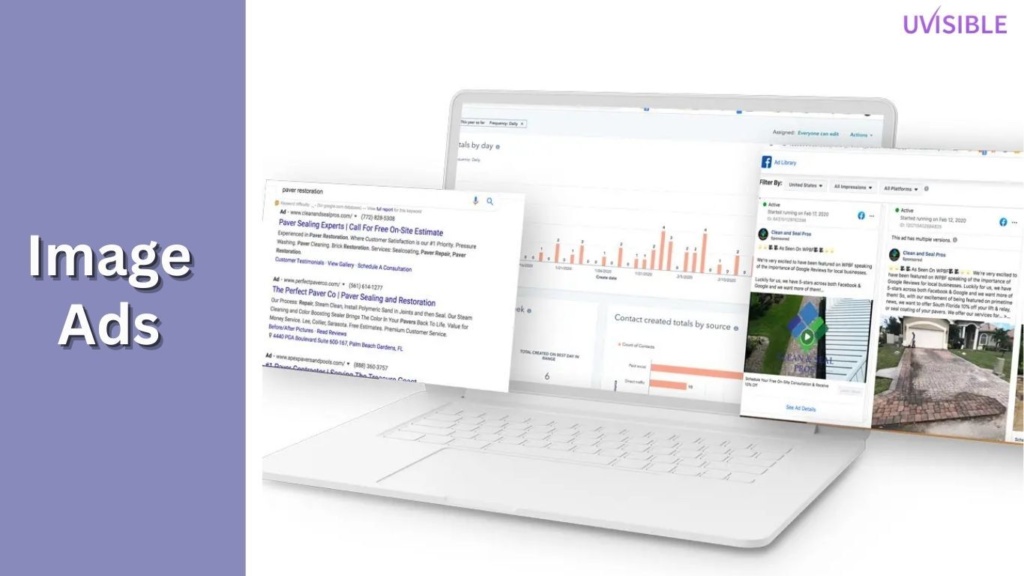
Image advertising is a sort of online advertisement that promotes a product, service, or brand by using static or moving images.
- Impressions
An impression is tallied in PPC (pay-per-click) advertising when an advertisement is presented on a user’s screen, regardless of whether the user clicks on the ad.
- Impression Share (IS)
Impression Share is a PPC Advertising indicator that calculates the proportion of impressions obtained by your advertising out of the total number of impressions eligible for your ads.
- Instagram Ads
Instagram Ads is a sort of advertising offered on Facebook’s Instagram platform.
It is a type of pay-per-click (PPC) advertising in which businesses build advertisements and promote them to a specific audience on Instagram.
- Interest Categories
In the PPC glossary of term, interest categories refer to groupings of online consumers who share common interests and habits.
Marketers can target their adverts based on data acquired by ad networks and platforms from consumers’ browsing and search history, social media activity, and other online habits.
- Invalid Clicks
Invalid clicks are the prominent PPC marketing term which means any clicks on ads that are created by automated scripts, bots, or other fraudulent techniques rather than by genuine people.
These clicks can be purposeful or inadvertent, and they can be produced by a variety of factors, including click fraud, accidental clicks, or low-quality traffic sources.
- Key Performance Indicator (KPI)
In the PPC glossary of terms, a key performance indicator (KPI) is a measurable metric that shows how well a PPC campaign is reaching its goals.
- Keywords
Keywords are precise words or phrases that advertisers employ to target potential consumers in their PPC marketing campaigns.
These keywords are chosen based on their relevance to the business or product, and they are used to trigger advertisements to appear when someone searches for those specific words or phrases on a search engine or visits a website that contains those words or phrases.
- Keyword Matching Options
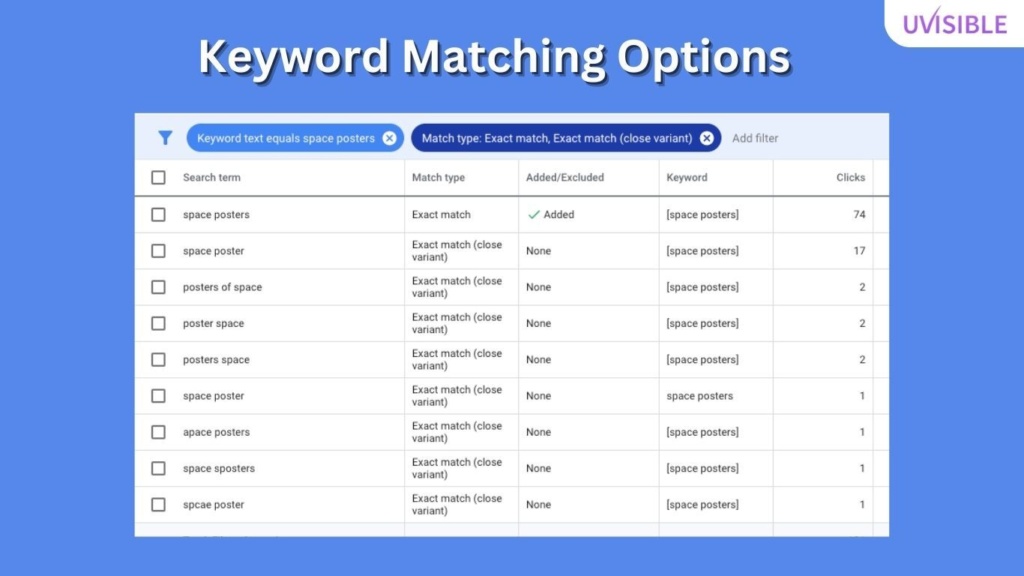
Keyword matching parameters are PPC search terms which specify how closely a user’s search phrase must match a keyword for an advertisement to show.
In PPC advertising, there are four keyword matching options: broad match, phrase match, exact match, and negative match.
- Keyword Research
Keyword research as a PPC general terms is the process of researching and selecting the most relevant terms that potential buyers are likely to use while looking for a product or service.
It entails researching and comprehending the target audience’s search activity to discover the keywords they use to find similar items or services.
- Keyword Planner
Keyword Planner is one of the top SEO software or a keyword research tool supplied by Google Ads (previously Google AdWords) for PPC advertising.
It enables marketers to find relevant keywords relating to their products, services, or business and assists them in selecting the best keywords to target in their ad campaigns.
These PPC terms, show keyword search volume, competitiveness, and suggested bids for each term, as well as any similar keywords that may be relevant to the advertiser’s campaign.
- Landing Page
A landing page is a single web page that is particularly built and optimised for a PPC campaign.
It is the page that a user gets at after clicking on a PPC ad, and it is intended to fulfil the promise stated in the ad while also encouraging the user to perform a certain action, such as completing a purchase or filling out a form.
- Lead
A lead is a potential customer who has demonstrated interest in a product or service by taking some type of action, such as completing a contact form, filling out a survey, or dialling a phone number, in PPC advertising.
Want to ramp up your lead generation with one of the BEST PAY PER CLICK AGENCIES in town? Connect with Uvisible here!
- LinkedIn Ads

LinkedIn Ads are a type of pay-per-click (PPC) advertising that enables businesses to access a highly targeted audience of professionals on the LinkedIn social networking platform.
Businesses may utilise LinkedIn Advertising to develop and show advertisements that appear on the site’s front page, search results, and user profiles.
- Location Extensions
Location extensions are ad extensions in PPC advertising that allow marketers to display their company address, phone number, and a map marker alongside their adverts.
Local companies that wish to target visitors who are looking for products or services in their region will find location extensions very beneficial.
- Location Targeting
In PPC glossary of terms, location targeting refers to the practice of defining a geographic place for the distribution of online adverts.
Marketers can target specific geographic areas such as nations, states, cities, or even a radius around a given spot.
- Long tail Keywords
Long tail keywords are precise and highly focused search queries that often consist of three or more words in PPC advertising.
As a PPC marketing term, they are more narrow and less often searched keywords, yet they may be quite useful in generating relevant visitors to a website. Long-tail keywords have less competition and may be less expensive to bid on in PPC ads since they are more precise.
- Low Search Volume
Low search volume in PPC advertising refers to a circumstance in which a term or keyword phrase receives very little or no search traffic.
This suggests that users are not actively looking for that term, and as a result, the keyword may generate no impressions or clicks.
- Managed Placements
Managed placements are a PPC advertising targeting option that allows marketers to select certain websites or web pages where they want their adverts to appear.
- Manual Bidding
Manual bidding is a PPC advertising bidding approach in which advertisers select the maximum amount they are ready to spend for a click or impression on their ad.
- Manual Tagging
Among this long list of PPC search terms, manual tagging refers to the process of manually adding tracking information to an ad’s destination URL.
These metrics are used to assess ad performance and evaluate campaign effectiveness.
- Match Type
Match type refers to the parameters in PPC advertising that define how closely a user’s search query must match the advertiser’s specified keywords for an ad to show.
- Marketing Metrics
In this PPC terms list, marketing metrics are quantitative indicators that are used to assess the effectiveness of marketing initiatives and strategies.
Marketing metrics in PPC advertising might include things like click-through rate (CTR), cost-per-click (CPC), conversion rate, cost-per-acquisition (CPA), return on ad spend (ROAS), and more.
- Message Extensions
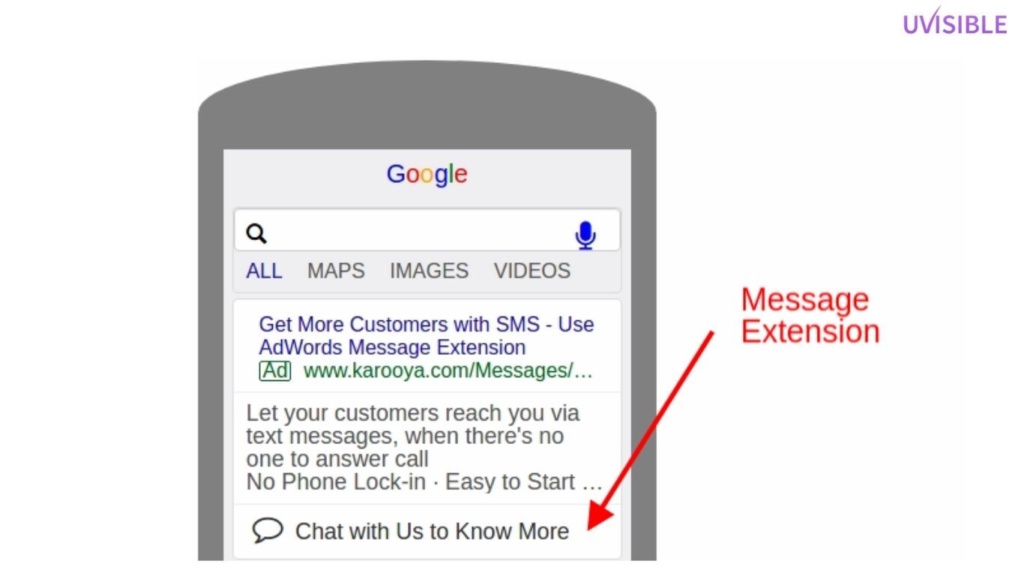
Message extensions are a form of ad extension in PPC marketing that allows marketers to incorporate a clickable button in their advertising that, when clicked, opens a text message.
- Modified Broad Match
In PPC glossary of terms, Modified Broad Match is a match type that allows advertisers to select certain keywords as “modifiers” to widen or limit the reach of their adverts.
Advertisers can employ a modified wide match by adding a plus sign (+) before one or more keywords in a keyword phrase to signal that these phrases must occur in the user’s search query for the ad to display.
- My Client Center
Google Ads’ My Client Center (MCC) is a solution that allows marketers and agencies to manage numerous Google Advertising accounts from a single interface.
- Negative Keywords
This particular PPC terms known as negative keywords are a form of PPC keyword that allows marketers to omit certain search phrases that are irrelevant to their advertising aims.
Negative keywords are the inverse of ordinary keywords, which are used to target specific search phrases related to an advertiser’s product or service.
- Negative Placements
Negative placements are websites or pages on which advertisers do not want their advertisements to appear.
Advertisers can prohibit their adverts from showing on websites or pages that are irrelevant or inappropriate for their intended demographic by using negative placements.
- New Visitor
A “new visitor” in PPC advertising is a person who visits a website for the first time after clicking on a paid search ad.
Eagerly waiting for New Visitors to your Dental clinic site? Hire Uvisible as your Goal-Oriented DIGITAL MARKETING for DENTISTS Agency
- Opportunities Tab
The opportunities tab is a feature of PPC (Pay-Per-Click) advertising systems that provides marketers with recommendations and suggestions for enhancing the success of their ad campaigns.
- Organic Search Results
Organic search results are non-paid search engine results that display when a user performs a search query on a search engine results page (SERP).
- Pay-Per-Action
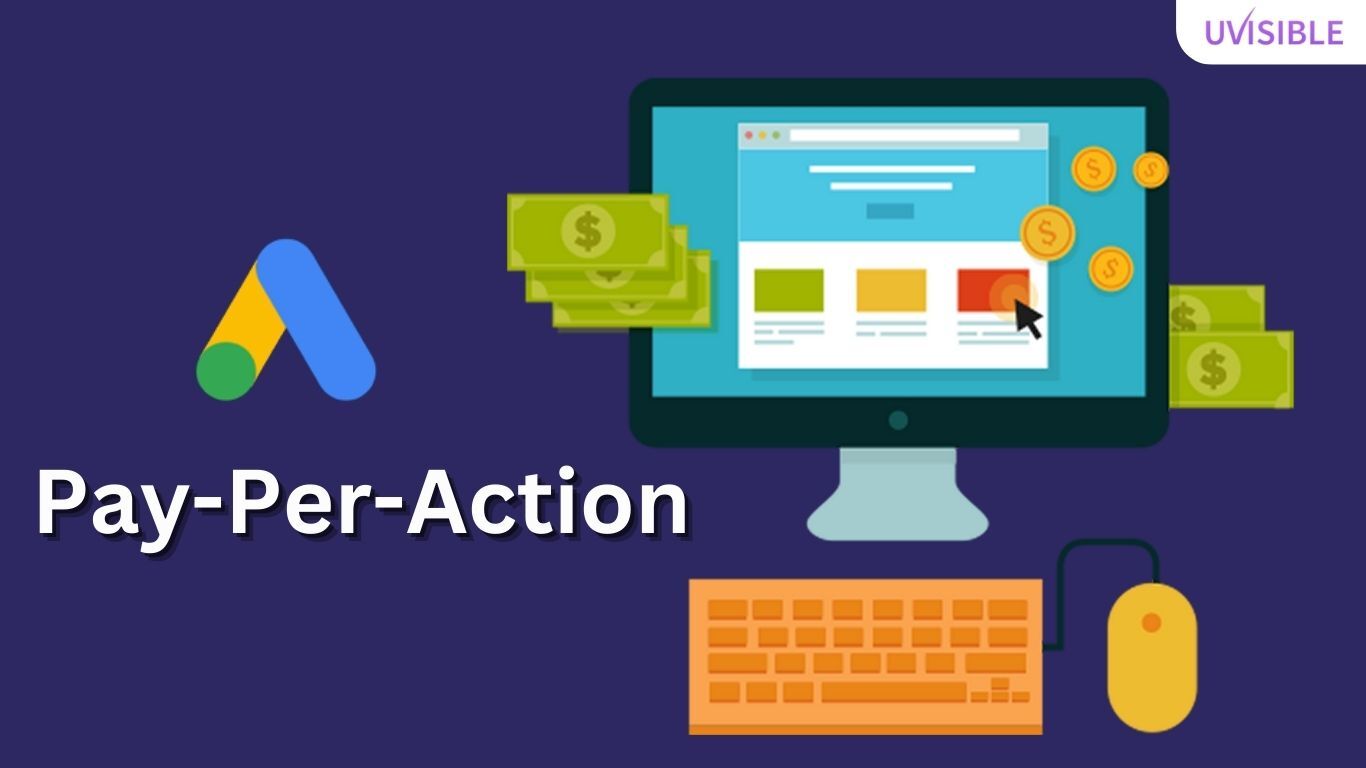
Pay-per-action (PPA) is a type of online advertising pricing model in which an advertiser pays only when a specified action on their website is accomplished by the user.
This PPC term is also referred to as ‘Pay-per-acquisition’ or ‘Cost-per-action’.
- Pay-Per-Click
PPC advertising is a digital advertising approach in which advertisers pay a charge each time one of their advertisements is clicked.
In other words, this PPC marketing term is a method of purchasing website views rather than seeking to acquire those visits naturally.
Want to Outsource PPC Services for better results, custom bid management, and higher ROI? Talk to Uvisible Now as your dedicated OUTSOURCE PPC AGENCY INDIA!
- Pay-Per-Click Management
PPC management is the practice of monitoring and managing a company’s PPC advertising campaigns.
PPC advertising is a digital advertising approach in which advertisers pay a charge each time one of their advertisements is clicked.
- Performance Max Campaign
Performance Max is a type of Google Ads campaign that uses automation and machine learning to assist advertisers in meeting their performance objectives across numerous ad formats and networks.
It is intended to assist advertisers in increasing conversions and revenue by automatically determining the appropriate ad style and targeting choices for each ad impression depending on several characteristics such as the user’s device, location, and behaviour.
Want to know how AI is changing the PPC ad campaign formation? Have a detailed look at ChatGPT for PPC!
- Phrase Match
Phrase match is a keyword-matching option in PPC advertising that shows your ad if a user’s search query contains the precise phrase you’ve selected, regardless of whether other terms come before or after it.
- Pinterest Ads
Pinterest Ads are a sort of pay-per-click (PPC) advertising that allows marketers to promote their products, services, or content to Pinterest users.
Advertisers may build promoted pins, sponsored carousels, promoted video pins, and other ad formats using Pinterest Ads, which are subsequently displayed to users who are searching, browsing, or engaging with content on the site.
- Placement Exclusions
In PPC glossary of terms, placement exclusions relate to the practice of blocking ads from showing on specific websites or web pages that are not regarded as acceptable or relevant for a specific advertising campaign.
- Placement Targeting
Placement targeting, a.k.a Managed Placements is a feature in PPC advertising that allows marketers to pick which websites or areas of websites they want their adverts to appear on.
- Placement Tool
The Placement Tool is a Google Ads function that helps marketers to locate websites where their adverts can be placed. This technique assists marketers in reaching their target demographic by displaying their advertisements on relevant websites.
- Price Extensions
Price extensions are a form of Google Ads ad extension that allows marketers to show the price of their products or services directly within search advertising.
They show beneath the ad as a clickable drop-down menu with several product or service alternatives and costs.
- Primary Metric
A key metric in PPC (Pay-Per-Click) advertising is the most essential parameter used to assess campaign success.
It is the primary performance measure used by marketers to judge whether or not their campaign is accomplishing their marketing objectives.
- Product Listing Ads
Product Listing Ads (PLAs) are a sort of PPC advertising format offered by Google that allows online shops to display photos and product information to consumers searching for specific goods on Google’s search engine.
- Promotion Extensions
In PPC glossary of terms, promotion extensions are a sort of ad extension that allows marketers to showcase special offers and promotions within their search advertisements.
- Prospect
A prospect in PPC advertising is a possible consumer who has expressed interest in the product or service being marketed.
Prospects are frequently discovered through numerous techniques, such as clicking on an ad, filling out a form, or engaging with a product or service-related information.
- Qualified Web Traffic
Qualified online traffic is one of the known PPC terms which refers to website users who are more likely to be interested in a company’s products or services and are more likely to convert into customers.
- Quality Score
Quality Score is a metric used in pay-per-click (PPC) advertising, specifically Google Ads.
It is a measure of how relevant and beneficial your ad is to the user, based on a mix of criteria such as the ad’s click-through rate (CTR), ad content relevancy to the term, and landing page quality.
A higher quality score usually translates into better ad positioning and a lower cost-per-click (CPC) for the advertiser.
- Reach
Reach is one of the most common PPC general terms which refers to the total number of individuals who have encountered an ad. It is the estimated number of people who have seen or may have seen an advertisement.
- Remarketing
In PPC advertising, remarketing is a strategy that allows marketers to display customised adverts to visitors who have previously interacted with their website or mobile app.
This advertising may be seen on a variety of platforms, including Google, Facebook, and Instagram.
- Remarketing Lists for Search Ads (RLSA)
Remarketing Lists for Search Ads (RLSA) is a PPC advertising technology that allows marketers to target advertisements to individuals who have previously engaged with their website or brand when searching on Google.
- Returning Visitor
A returning visitor in PPC advertising is a user who has previously visited a website or landing page via a PPC ad and is returning to the same website or page.
- Return on Ad Spend (ROAS)
Return on ad spend (ROAS) is a statistic used in PPC advertising to assess campaign success. It is computed by dividing the campaign’s income by the amount spent on the campaign.
A greater ROAS implies a more lucrative campaign. ROAS is stated as a ratio or a percentage.
- Return on Investment (ROI)
The amount of profit or revenue generated by a PPC campaign in comparison to the total amount spent on the campaign is referred to as the return on investment (ROI) in PPC advertising.
This PPC terms, is a key performance indicator (KPI) that is used to assess the efficacy and profitability of a PPC campaign.
- RevContent
Revcontent is a content recommendation platform that provides marketers with native advertising options.
It is a sponsored discovery platform that displays advertisements in the guise of content suggestions.
- Sales Funnel
The sales funnel is a marketing concept that explains the path a consumer takes from first being aware of a product or service to eventually purchasing it.
This PPC terms, is often divided into many stages, which might vary based on the business and the marketing approach. The common stages of the sales funnel are Awareness, Interest, Desire, and Action (AIDA).
- Search Engine
A search engine, in the context of PPC advertising, is a platform that allows advertisers to show their adverts to people who are looking for certain keywords or phrases related to their products or services.
- Search Engine Marketing (SEM)
In PPC advertising, search engine marketing (SEM) refers to the practice of paying to advertise a business, product, or service on search engine results pages (SERPs).
- Search Engine Optimization (SEO)
Search Engine Optimization (SEO) is the practice of improving a website’s visibility and rating on search engine results pages (SERPs) for relevant keywords and phrases.
Want to know more about SEO and PPC? Do check out our blog on “SEO vs PPC: Which is Better for Your Business Growth?“
- Search Engine Results Page (SERP)
The Search Engine Results Page (SERP) is the page that search engines show in response to a search query.
Depending on the search engine and the search query, it typically comprises a list of results related to the user’s search query, which may include organic search results, sponsored search advertising, featured snippets, knowledge graphs, and other sorts of information.
- Search Network
The search network in PPC advertising refers to a collection of websites and search engines, such as Google Search, Bing, and Yahoo, where marketers may display their adverts to consumers who are actively looking for relevant keywords or phrases.
For example, if you opt to display your ads on Google, then you can also avail of the services of Google Maps and Google Images as a subsequently paid ad platform.
- Search Marketing
Search marketing is a sort of digital marketing in which a company or product is promoted using search engines.
This can be accomplished via search engine optimisation (SEO) to increase a website’s organic search ranks, or by paid search advertising (PPC advertising) to appear at the top of search engine results pages (SERPs) for certain search queries.
- Search Partners
Search partners are websites and other online platforms that have agreed to display adverts from search engines on their platforms.
Advertisers that conduct campaigns on the search network may see their advertisements display on search partner sites as well.
- Search Query
This PPC marketing term, refers to the specific words or phrases that a user types into a search engine to obtain information or a solution to their problem.
- Search Query Report (SQR)
A search query report is a report produced by a search engine advertising platform that displays the actual search terms that caused your adverts to appear in search engine results pages.
- Small and Medium Sized Businesses PPC (SMB PPC)
Pay-per-click advertising campaigns for small and medium-sized enterprises are referred to as SMB PPC (SMBs).
These campaigns often entail the placement of advertisements on search engines and social media platforms that target specific keywords or audiences related to the SMB’s products or services.
- Search Volume
In PPC advertising, search volume refers to the number of times a specific term or phrase is searched for in a search engine during a given period, such as a month.
- Seller Central
Seller Central is a web-based platform provided by Amazon to sellers who want to sell their items on the Amazon marketplace.
- Seller Central Sponsored Product Ads
Seller Central Sponsored Product Advertising, similar to Google Ads, is a sort of PPC advertising that allows sellers to promote their items on Amazon’s search results page.
This sort of PPC terms, is offered to merchants that manage their accounts using Amazon’s Seller Central platform.
- Seller Central Placement Ads
Seller Central Placement Ads are a sort of advertising that Amazon merchants may access through Amazon Advertising. These ads appear on Amazon product detail pages, search results pages, and in other places around the Amazon platform.
- Seller Rating Extension
In PPC advertising, a seller ratings extension is a form of ad extension that shows beneath the text ad on the search results page.
It displays the advertiser’s rating based on customer reviews, comments, and ratings.
- Shared Budgets
Shared budgets are a feature in PPC advertising that allows marketers to distribute a single budget over numerous campaigns or ad groups.
- Shopping Ads
Shopping advertisements are a sort of ad format in PPC advertising that allows eCommerce product pages to market their items through Google search results.
- Sitelinks Extensions
In a PPC advertisement, sitelink extensions are extra links that display below the primary ad content.
These are extra URLs that can direct viewers to specific pages on the advertiser’s website, such as product pages, contact pages, or special deals.
- Snapchat Ads
Snapchat Ads is a Pay-Per-Click (PPC) advertising platform that allows companies to display advertisements on the Snapchat app.
- Smart Bidding
Smart Bidding is a sort of PPC advertising automated bidding method that employs machine learning and artificial intelligence (AI) to optimise bids for each ad auction in real time.
- Split Test
A split test (also known as an A/B test or a multivariate test) in PPC advertising is the practice of comparing two or more variants of an ad or landing page to see which one performs better in terms of a desired outcome.
- Sponsored Product Ads
Sponsored Product Ads are one of the advertising formats accessible through Amazon Advertising.
This PPC search terms, give sellers and merchants the ability to promote their items on Amazon’s search results pages and product detail pages.
- Sponsored Results
Sponsored results in PPC advertising often refer to adverts that display at the top or bottom of a search engine results page (SERP) and are designated as “sponsored” or “ad.”
Advertisers often pay for this advertising by bidding on specific keywords and competing for ad placement in the search engine’s ad auction.
- Structured Snippet Extensions
Structured Snippet Extensions are a sort of PPC ad extension that allows marketers to promote certain parts of their products or services, such as features, brands, models, and so on.
- Text Ad
In PPC advertising, a text ad is a sort of advertisement that shows in the search engine results page (SERP) and is made up of simple text, with no graphics or videos.
- Text Placeholders
In PPC advertising, text placeholders are gaps inside an ad where text can be introduced or modified.
These are pre-defined regions inside an ad template that may be changed with unique ad content or information.
- TikTok Ads
TikTok Ads is a paid advertising platform that enables businesses to reach their target audience on the popular social media app TikTok.
TikTok Ads provides a variety of ad types, such as in-feed videos, brand takeovers, hashtag challenges, branded effects, and more.
- Topics Targeting
Topic targeting is a PPC advertising tool that allows marketers to show adverts to people who are interested in certain topics or categories of content.
- Tracking Code
In PPC glossary of terms, a tracking code is a piece of code that is applied to a website or landing page to measure user activity and conversions.
A tracking pixel, conversion pixel, or tracking tag is another name for this code.
- Traffic Estimator
A traffic estimator in PPC advertising is a tool that helps marketers estimate how much traffic they could receive for a single keyword or combination of keywords in a specific area.
- TrueView Video Ads
TrueView is a sort of video ad format available through Google Ads as part of its PPC advertising services.
TrueView advertisements are skippable video commercials that display before, during, or after YouTube videos, allowing marketers to pay only when a viewer watches the video for a specific length of time or interacts with the ad.
- Twitter Ads
Twitter Ads is a platform that enables advertisers to build and show advertisements on the social media network Twitter.
Businesses may use Twitter Advertising to generate several sorts of ads, such as promoted tweets, promoted accounts, and promoted trends.
- Unique Visitor
A unique visitor in PPC advertising is a single person that visits a website or clicks on an ad during a certain period, regardless of how many times they visit or click on the ad.
The term “unique” means that the visitor is only counted once, regardless matter how many visits or clicks they performed.
- User
A user is an individual who interacts with an online advertisement or website in the context of PPC advertising.
This PPC terms refers to a range of actions that a person may perform, such as clicking on an ad, visiting a website, or completing a specific activity, such as filling out a form or making a purchase.
- User ID
A user ID is a unique identifier issued to an individual user or account on a certain advertising platform or website in PPC advertising.
- Vendor Central
Vendor Central is a platform that allows manufacturers and distributors to sell directly to Amazon.
It enables suppliers to manage their Amazon product listings, inventory, and price, as well as have access to numerous marketing and advertising options, such as PPC advertising.
- View-Through Conversion
View-through conversion is a PPC advertising measure that records people who saw an ad but did not click on it but later converted on the advertiser’s website.
- View-Through Rate
View-through rate (VTR) is a PPC advertising metric that calculates the proportion of visitors who saw an ad but did not click on it but later returned to the advertiser’s website and completed a conversion or action.
- Video
Video refers to an advertising format that employs video material to advertise a product or service in the context of PPC advertising.
Video ads may be seen on a variety of platforms, including YouTube, Facebook, Instagram, and other video networks.
- Visitor
A visitor in PPC advertising is a person who visits a website or a landing page after clicking on a PPC ad.
Visitors are potential consumers who have expressed an interest in a specific product or service by clicking on the ad.
It’s High Time for Hair and Beauty Salons to Increase the Traffic of Visitors on their PPC ads with Uvisible’s PPC ADVERTISING for HAIR SALONS Services!
- Website Optimizer
Website optimizer, often known as conversion rate optimisation (CRO), is the practice of improving the conversion rate of a website or landing page.
This PPC marketing term is used to increase the efficacy of the landing page to which the user is routed after clicking on an ad.
- YouTube Ads
YouTube Advertising is a sort of pay-per-click (PPC) advertising that allows businesses to advertise their video content on YouTube in order to reach their target audience.
These commercials can take several forms, including skippable and non-skippable video ads, bumper ads, and sponsored cards.
FAQs
Q1. What is PPC?
PPC stands for pay-per-click, which is a digital marketing model where advertisers pay each time a user clicks on one of their ads. It’s a way to drive traffic to a website, and advertisers only pay for the clicks they receive.
Q2. What is a PPC campaign?
A PPC campaign is a set of ad groups that target specific keywords or demographics. Advertisers create and manage PPC campaigns to drive traffic to their website, generate leads, or make sales.
Q3. What is a keyword?
A keyword is a specific word or phrase that advertisers bid on to show their ads to potential customers. Keywords are the foundation of a PPC campaign, and advertisers choose relevant keywords that are likely to be searched by their target audience.
Q4. What is a bid?
A bid is the amount of money an advertiser is willing to pay for each click on their ad. Bids are set at the keyword level, and advertisers can adjust their bids based on factors like competition, ad quality, and budget.
Q5. What is ad rank?
Ad rank is a metric used by search engines like Google to determine the position of an ad on a search results page. Ad rank takes into account the advertiser’s bid, ad quality, and expected click-through rate, among other factors.
Q6. What is quality score?
Quality score is a metric used by search engines to measure the quality and relevance of an ad and its landing page. Advertisers with higher quality scores may have lower costs per click and higher ad positions.
Q7. What is a landing page?
A landing page is the page on a website where users are directed after clicking on an ad. A landing page should be relevant to the ad and provide a clear call to action for the user.
Q8. What is a conversion?
A conversion is the desired action that a user takes on a website after clicking on an ad. Conversions can include making a purchase, filling out a form, or signing up for a newsletter.
Q9. What is a click-through rate?
Click-through rate (CTR) is the percentage of users who click on an ad after seeing it. A high CTR indicates that an ad is relevant and engaging to its target audience.
Q10. What is a cost per click?
Cost per click (CPC) is the amount of money an advertiser pays for each click on their ad. CPC is determined by factors like the advertiser’s bid, ad quality, and competition.
About us and this blog
We are a digital marketing company with a focus on helping our customers achieve great results across several key areas.
Request a free quote
We offer professional SEO services that help websites increase their organic search score drastically in order to compete for the highest rankings even when it comes to highly competitive keywords.



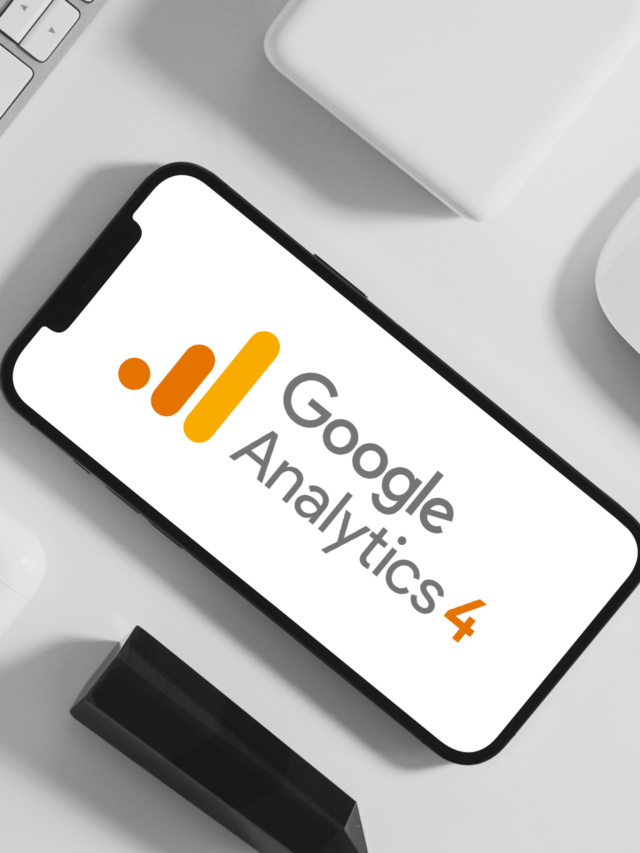


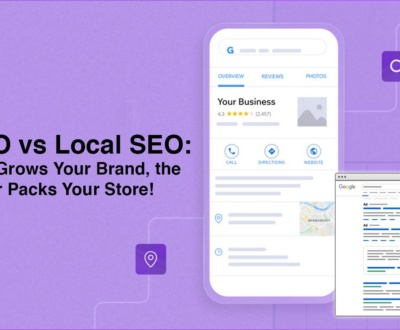

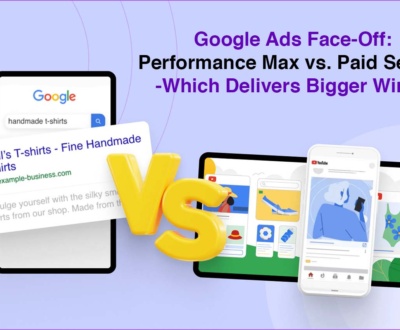
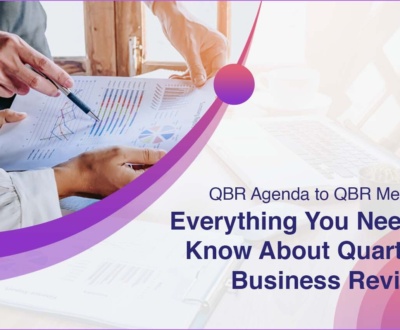

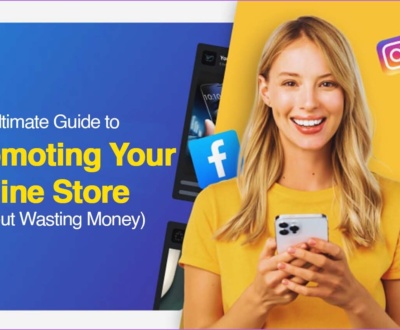
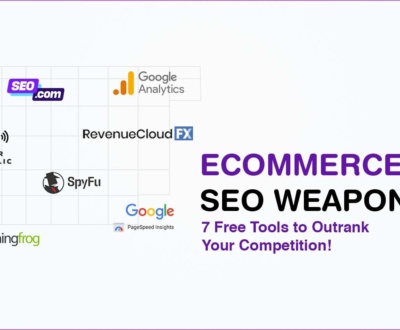

Pingback: A Guide for “How to Manage and Measure Local PPC Accounts” - Uvisible
Pingback: Best PPC Tools for Growing Your ROI by 5X - Uvisible
Pingback: How to use ChatGPT for PPC? - Uvisible
Pingback: SEO vs PPC: Which is Better for Your Business Growth? - Uvisible
Pingback: Google Ads vs Facebook Ads: Which Drives Better Results? - Uvisible
Pingback: Ultimate Guide to PPC Marketing: Boost your ROI Now - Uvisible
Pingback: Successful PPC Campaign: Step-by-Step Guide - Uvisible
Pingback: Complete PPC Strategy for Ecommerce - Uvisible